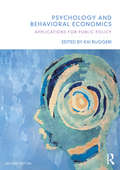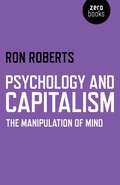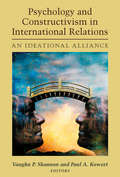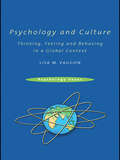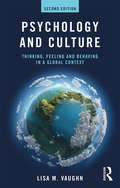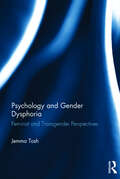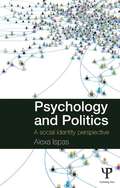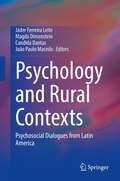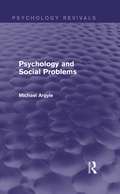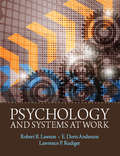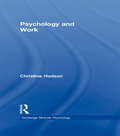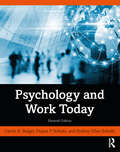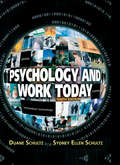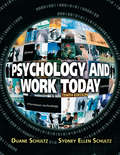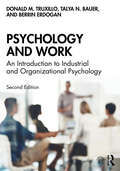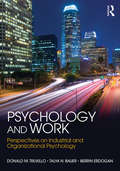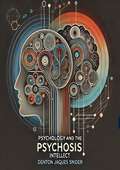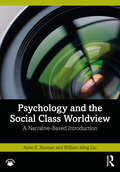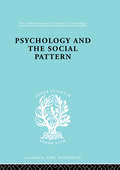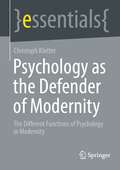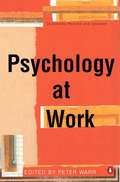- Table View
- List View
Psychology and Behavioral Economics: Applications for Public Policy
by Kai RuggeriPsychology and Behavioral Economics offers an expert introduction to how psychology can be applied to a range of public policy areas. It examines the impact of psychological research for public policymaking in economic, financial, and consumer sectors; in education, healthcare, and the workplace; for energy and the environment; and in communications. Your energy bills show you how much you use compared to the average household in your area. Your doctor sends you a text message reminder when your appointment is coming up. Your bank gives you three choices for how much to pay off on your credit card each month. Wherever you look, there has been a rapid increase in the importance we place on understanding real human behaviors in everyday decisions, and these behavioral insights are now regularly used to influence everything from how companies recruit employees through to large-scale public policy and government regulation. But what is the actual evidence behind these tactics, and how did psychology become such a major player in economics? Answering these questions and more, this team of authors, working across both academia and government, present this fully revised and updated reworking of Behavioral Insights for Public Policy. This update covers everything from how policy was historically developed, to major research in human behavior and social psychology, to key moments that brought behavioral sciences to the forefront of public policy. Featuring over 100 empirical examples of how behavioral insights are being used to address some of the most critical challenges faced globally, the book covers key topics such as evidence-based policy, a brief history of behavioral and decision sciences, behavioral economics, and policy evaluation, all illustrated throughout with lively case studies. Including end-of-chapter questions, a glossary, and key concept boxes to aid retention, as well as a new chapter revealing the work of the Canadian government’s behavioral insights unit, this is the perfect textbook for students of psychology, economics, public health, education, and organizational sciences, as well as public policy professionals looking for fresh insight into the underlying theory and practical applications in a range of public policy areas.
Psychology and Capitalism: The Manipulation of Mind
by Ron RobertsPsychology and Capitalism is a critical and accessible account of the ideological and material role of psychology in supporting capitalist enterprise and holding individuals entirely responsible for their fate through the promotion of individualism.
Psychology and Constructivism in International Relations: An Ideational Alliance
by Vaughn P. Shannon Paul Kowert"The conversation between political psychology and constructivism is essential and long overdue. By exploring the interaction of individual cognition and social processes, this 'ideational alliance' more fully explains how ideas work all the way down to shape world politics. " ---Theo Farrell, King's College London. "This is a worthwhile and engaging volume. Political psychology is gaining ground as an essential perspective to consider when analyzing international relations, and the book's focus on constructivism provides key insights into the relationship between identity, norms, and behavior---bedrock concepts in understanding the social underpinnings of global politics. " ---Mira Sucharov, Carleton University "An indispensable guide to understanding what distinguishes and what unites psychology and constructivism. A wonderful resource for political psychologists, constructivists, and their critics. " ---Jonathan Mercer, University of Washington Constructivist IR scholars study the ways in which international norms, culture, and identities---all intersubjective phenomena---inform foreign policy and affect the reaction to and outcomes of international events. Political psychologists similarly investigate divergent national self-conceptions as well as the individual cognitive and emotional propensities that shape ideology and policy. Given their mutual interest in human subjectivity and identity politics, a dialogue and synthesis between constructivism and political psychology is long overdue. The contributors to this volume discuss both theoretical and empirical issues of complementarity and critique, with an emphasis on the potential for integrating the viewpoints within a progressive ideational paradigm. Moreover, they make a self-conscious effort to interrogate, rather than gloss over, their differences in the hope that such disagreements will prove particularly rich sources of analytical and empirical insight. Jacket illustration © Ocean Photography/Veer
Psychology and Culture: Thinking, Feeling and Behaving in a Global Context
by Lisa VaughnWith increasing globalization, countries face social, linguistic, religious and other cultural changes that can lead to misunderstandings in a variety of settings. These changes can have broader implications across the world, leading to changing dynamics in identity, gender, relationships, family, and community. This book addresses the subsequent need for a basic understanding of the cultural dimensions of psychology and their application to everyday settings. The book discusses the basis of culture and presents related theories and concepts, including a description of how cognition and behavior are influenced by different sociocultural contexts. The text explores a broad definition of culture and provides practical models to improve intercultural relations, communication, and cultural competency. Each chapter contains an introduction, a concise overview of the topic, a practical application of the topic using current global examples, and a brief summary. This up to date overview of psychology and culture is ideal reading for undergraduate and graduate students and academics interested in culturally related topics and issues.
Psychology and Culture: Thinking, Feeling and Behaving in a Global Context
by Lisa VaughnThe increasing globalization of society is causing shifts in social, linguistic, religious, and other cultural differences, which may increase the potential for misunderstandings in communication, the workplace, health care, and education. The new second edition of Psychology and Culture provides an up-to-date overview of the cultural dimensions of psychology and the application to everyday settings. Vaughn presents a description of how thinking and behaviour are influenced by sociocultural context. Areas of focus include the basis of culture; research in psychology and culture; identity; human development; intercultural interactions; and basic psychological processes. The text explores a broader definition of culture which includes social dimensions, such as gender, religion, and socioeconomic status, and provides practical models to improve intercultural relations, intercultural communication, and cultural competency in education, organizations, relationships, and health. Written in a reader-friendly style, the text covers a broad range of topics with numerous examples across cultures to make the content come to life. The book covers transdisciplinary content in psychology and culture that will be of interest not only to psychologists interested in cultural issues and to scholars in related disciplines, but also to a more general audience seeking information on questions of cultural humility, globalization, multiple identities, social ecological processes, immigration, acculturation, and related topics.
Psychology and Gender Dysphoria: Feminist and Transgender Perspectives
by Jemma ToshPsychiatry and psychology have a long and highly debated history in relation to gender. In particular, they have attracted criticism for policing the boundaries of ‘normal’ gender expression through gender identity diagnoses, such as transvestism, transsexualism, gender identity disorder and gender dysphoria. Drawing on discursive psychology, this book traces the historical development of psychiatric constructions of ‘normal’ and ‘abnormal’ gender expression. It contextualizes the recent reconstruction of gender in the 5th edition of the Diagnostic and Statistical Manual of Mental Disorders (DSM-5) and its criteria for gender dysphoria. This latest diagnosis illustrates the continued disagreement and debate within the profession surrounding gender identity as ‘disordered’. It also provides an opportunity to reflect on the conflicted history between feminist and transgender communities in the changing context of a more trans-positive feminism, and the implications of these diagnoses for these distinct but linked communities. Psychology and Gender Dysphoria examines debates and controversies surrounding psychiatric diagnoses and theories related to gender and gender nonconformity by exploring recent research, examples of collaborative perspectives, and existing feminist and trans texts. As such, the book is relevant for postgraduate and postdoctoral researchers of gender, feminism, and critical psychology as well as historical issues within psychiatry.
Psychology and Gender: An Advanced Reader
by Sadhana Avinash NatuThis book provides an understanding of how psychology and gender are closely interrelated. It examines, critiques, and debunks some of the theoretical premises from mainstream psychology while remaining mindful and respectful of their utilities. The book brings together psychological concepts, theories, and paradigms and examines how they interplay with gender studies going beyond the typical understanding of gender as merely demographic variable. The volume discusses important concepts such as gender role development and interpersonal relationships across caste, class, genders, sexualities, race, and region. It also studies the significant link between psychology and gender and with feminism, women’s studies, the women’s movement, the queer movement, queer studies, as well as other social movements. It uses an interdisciplinary and multidisciplinary approach all through. This book will appeal to students, researchers, and teachers of psychology, applied psychology, gender and women studies, sociology, practitioners, activists, those working in not-for-profit organizations and those working specifically on engendering psychology. The book will also be valuable reading for those interested in South Asian studies and other interdisciplinary courses in social sciences.
Psychology and Politics: A Social Identity Perspective
by Alexa IspasWhat makes us divide the world into ‘us’ and ‘them’? How can we exert social influence over others? When does a peaceful protest turn into a riot? Why are some politicians heroes one day and villains the next? Where do we find the resources to resist authoritarian regimes? Taking these questions as a starting point, the book examines political conduct from a social identity perspective. Supported by over two decades of empirical research, this perspective distinguishes between our personal identity, which is prevalent when we think of ourselves as individuals, and our social identity, which comes to the fore when we think of ourselves as members of groups. The social identity perspective argues that our political behaviour is largely governed by our social identity, and discusses the implications this has for politics, particularly for social influence, crowd events, leadership, and authoritarian regimes. Accessible and engaging, the content covers a wide range of political topics, such as the way in which categorizing ourselves into groups influences how we perceive the social world, the implications of categorization for social influence, the development of crowd events, the dynamics of leadership, and the mechanisms underlying obedience under authoritarian regimes. The book will appeal to advanced undergraduate and postgraduate students across a range of disciplines, as well as to political activists and leaders.
Psychology and Rural Contexts: Psychosocial Dialogues from Latin America
by Jáder Ferreira Leite Magda Dimenstein Candida Dantas João Paulo MacedoThis book brings together a selection of theoretical reflections, empirical researches and professional experiences to showcase the increasing production of psychological studies in rural contexts developed in Latin America in recent years. Psychology’s tradition of science and eminently urban profession has produced a void of reflections and approaches on important actors of the societies that constitute their existence in rural contexts and in relation – whether of integration, conflicts and contradictions – with urban agents. But a new generation of psychologists are turning their attention to rural contexts, especially in Latin America. This volume aims to present a selection of these psychological studies and interventions developed in rural contexts from a psychosocial and interdisciplinary perspective, developed together with various social actors who live and work in rural spaces, that have an important relationship with land and nature both in terms of the elaboration of their history, the production of their subjectivities and identity ties with the territory, and the engagement in struggles for the right to land and for public policies that guarantee access to education and health services, technical assistance and infrastructure for its working activities. The book is divided in five parts, each one dedicated to a dimension of psychosocial studies and interventions in rural contexts: theoretical approaches; mental health and rural populations; social movements, communities and resistance practices; gender relations and subjectivation processes; and environment and sustainability. Chapters in each axis prioritize reports of experiences and research conducted with participatory approaches, producing new perspectives and reflections that contribute to the advancement of knowledge in the field of psychology, both regionally and globally.
Psychology and Social Problems (Psychology Revivals #Volume 2)
by Michael ArgyleFirst published in 1964, Psychology and Social Problems looks at a changing society and research into problems of the time. Many of the themes in the book, such as delinquency, mental health and racial conflict, are still familiar and current topics of discussion today. Social scientists had carried out extensive research into problems of urgent public concern, yet their findings were not widely known or understood and they had often been diffident in advocating policies based on their conclusions. Michael Argyle discussed the recent psychological and social research bearing on the origins of aggression, delinquency, mental disorder, racial and international prejudice, and industrial discontent; he went on to consider the implications of these studies for prevention and control and for the guidance of social change. This sophisticated and well-documented critique is presented with such lucidity and verve that it will appeal equally to laymen and to students and professional workers and can now be enjoyed in its historical context.
Psychology and Systems at Work
by Robert B. Lawson E. Doris Anderson Larry RudigerOrganizations matter. Most people spend a third to a half of their lives working in organizations. Given the high rates of unemployment people also spend more time looking for work. In addition, globalization and technological innovation continues to profoundly shape organizational culture, leadership, demography, and structure. For these and many other reasons, it is important for individuals to understand the nature of contemporary organizations. "Psychology and Systems at Work" provides know-how for retaining commitment to collective goals while taping the knowledge of a diverse workforce for riding the waves of change, utilizing mistakes to perfect systems, and insuring quality production. 21st Century theory, empirical findings, systemic intervention processes, and tool sets are thoroughly treated. Organizational life goes through times of relative harmony disrupted by periods of stress and uncertainty. However, in our own many decades of experience, we’ve been pleasantly surprised at how well people face challenges, defy the odds, and triumph. Success is the result of many factors—including good luck. But we have noticed, as Louis Pasteur observed long ago, that chance favors the prepared mind and resilient work habits. Learning Goals Upon completing this book, readers should be able to: Design systems that are flexible in a fast-changing environment Understand the basic foundations that shape organizational behavior Apply material they learn to real-life scenarios
Psychology and Work (Routledge Modular Psychology)
by Christine HodsonPsychology and Work provides a concise, user-friendly introduction to the field of occupational psychology. The book covers the main issues in the psychology of work and organizations. Topics discussed include the significance of work to the individual, the motivation to work, selection and training and the effects of work on health and quality of life. Organizational psychology is covered in such topics as group behaviour, leadership and management. The book assumes little or no background knowledge and is made accessible to all by the use of everyday examples throughout.Christine Hodson has produced an ideal text, designed for A Level students and undergraduates of psychology plus business studies new to this field.
Psychology and Work Today
by Duane P. Schultz Sydney Ellen Schultz Carrie A. BulgerPsychology and Work Today, 11th Edition is an exciting update of a well-loved textbook that introduces industrial and organizational psychology, explaining how industrial-organizational psychologists make work and working better. This accessible and informative text explains how industrial-organizational psychologists help organizations hire the best people by designing tests and interviews that uncover the skills and abilities of applicants, make work better by removing or reducing safety issues and sources of stress so that personnel are motivated and able to perform to their abilities, and work with managers and leaders to be more effective at leading others. This book also describes how industrial-organizational psychologists work with organizations to embrace diversity in the workforce and celebrate the strengths that employees from many backgrounds bring to organizations. In addition, this text includes how psychologists help organizations to design the physical work environment to best suit employees, while other psychologists help organizations to market their products and services to consumers. This text covers both the essential and traditional industrial-organizational psychology topic areas such as job analysis, employee selection, and work motivation as well as topic areas that are important in workplaces today such as stress and well-being, human factors, and preparing for jobs of the future. The chapter on consumer psychology remains unique to this textbook. This new edition includes coverage of employable skills desired by hiring managers and executives; the ways the highly publicized replicability crisis has affected the science and practice of industrial-organizational psychology; online and mobile employment testing; diversity and inclusion throughout the workplace, including microaggressions; preparing people and organizations for jobs of the future; incivility and harassment at work, including abusive supervision; safety climate and employee health; and advertising on social media and video games. Including many illustrative examples of industrial-organizational psychology in real-world workplaces, the 11th Edition is thoroughly updated to include the latest theory, research, and practice on each key topic. Each chapter features defined key terms, a chapter outline, a chapter summary, review questions, annotated additional reading, and engaging Newsbreak sections. The book will be of interest to undergraduate students in introduction industrial-organizational psychology or psychology of work behaviour courses.
Psychology and Work Today
by Carrie A. Bulger Duane P. Schultz Sydney Ellen SchultzThis key textbook introduces students to the field of industrial and organizational psychology, explaining how industrial-organizational psychologists make work and working better. It explains how industrial-organizational psychologists help organizations hire the best people, make work safer and less stressful, and support managers and leaders to be more effective at leading others. It also describes how industrial-organizational psychologists work with organizations to embrace diversity in the workforce, design the physical work environment to best suit employees, and market their products and services to consumers.Key features of this edition include: Coverage of both the essential and traditional I-O topic areas such as job analysis, employee selection, and work motivation, as well as topic areas that are important in workplaces today such as stress and well-being, human factors, and preparing for jobs of the future. New or expanded coverage of teams in organizations, remote/hybrid work, quiet quitting, and diversity, equity, and inclusion issues, A streamlined methods chapter that focuses more on specific methods used by industrial-organizational psychologists, such as focus groups, surveys, and Gallup polls. Rich with various pedagogical tools and real-world examples, the book will be of interest to undergraduate students in introduction industrial-organizational psychology or psychology of work behaviour courses.
Psychology and Work Today, 10th Edition
by Duane P. Schultz Sydney Ellen SchultzFor undergraduate-level courses in Industrial and Organizational Psychology, Business Psychology, Personnel Psychology and Applied Psychology. Psychology and Work Today provides an invaluable foundation for anyone entering today's global business and industrial world. This informative, sophisticated, and entertaining text teaches students about the nature of work in modern society. By focusing on the practical and applied rather than the scientific ideal, the authors demonstrate how industrial-organizational psychology directly impacts our lives as job applicants, trainees, employees, managers, and consumers.
Psychology and Work Today: Pearson New International Edition CourseSmart eTextbook
by Duane Schultz Sydney Ellen SchultzFor undergraduate-level courses in Industrial and Organizational Psychology, Business Psychology, Personnel Psychology and Applied Psychology. Psychology and Work Today provides an invaluable foundation for anyone entering today's global business and industrial world. This informative, sophisticated, and entertaining text teaches students about the nature of work in modern society. By focusing on the practical and applied rather than the scientific ideal, the authors demonstrate how industrial-organizational psychology directly impacts our lives as job applicants, trainees, employees, managers, and consumers.
Psychology and Work: An Introduction to Industrial and Organizational Psychology
by Berrin Erdogan Donald M. Truxillo Talya N. BauerPsychology and Work is a new edition of the award-winning textbook written for introductory Industrial and Organizational (I-O) Psychology classes. This book makes the core topics of I-O Psychology clear, relevant, and accessible to students through its dynamic design. The real-world examples from the perspectives of employees and employers highlight how I-O Psychology is applied to today’s workplace. Psychology and Work, Second Edition covers the core areas of I-O Psychology including an overview of the field and its history. The topics covered include up-to-date research methods and statistics; job analysis and criterion measurement; performance appraisal; personnel selection; training and development; work motivation; leadership; job attitudes and emotions, occupational health psychology, safety, and stress; teams; and organizational structure, culture, and change. Throughout the text, an emphasis is placed on essential issues for today’s workplace such as diversity and inclusion, the evolving role of big data and analytics, legal issues, and the changing nature of work. Written by dedicated I-O professors with expertise in I-O Psychology and teaching this course, the book and supporting materials provide a range of high-quality pedagogical materials, including interactive features, quizzes, PowerPoint slides, numerous case studies, recommended videos, and an expanded, high-quality test bank.
Psychology and Work: Perspectives on Industrial and Organizational Psychology
by Berrin Erdogan Donald M. Truxillo Talya N. BauerPsychology and Work is a new textbook for introductory Industrial and Organizational (I/O) Psychology classes. Written by award-winning I/O professors with expertise in I/O Psychology and teaching this course, the book is organized into three main sections. It first includes an overview of the history of I/O Psychology and a chapter on research methods, subsequently covers the core principles of Industrial Psychology, and then discusses the key areas of Organizational Psychology.The book contains numerous features that highlight key concepts and their relevance to students: Learning goals direct students to the main objectives of each chapter What Does This Mean for You? and Workplace Application boxes address the implications of the material for students Case studies with accompanying questions illustrate how concepts are relevant in real-world practice Reading lists and Your Turn questions provide further discussion Keywords defined in the margins help students grasp important concepts Sections discussing global and current issues give students a sense of what’s happening in the I/O psychology field The book also has extensive online resources such as interactive features, quizzes, PowerPoint slides, and an instructor’s manual. Accompanied by a dynamic design and a strong set of pedagogical tools, Psychology and Work presents all-new content and relevant coverage for the I/O psychology course.
Psychology and the Choice of a Career (Psychology Revivals)
by F. M. EarleOriginally published in 1933, Psychology and the Choice of a Career formalizes the art of vocational guidance, which was growing in public interest at the time. It sets out the points to consider when choosing a career path and the abilities you may need. It was a valuable tool to those seeking employment for the first time in the early twentieth century. Today it can be read in its historical context.
Psychology and the Conduct of Everyday Life
by Ernst Schraube Charlotte HøjholtPsychology and the Conduct of Everyday Life moves psychological theory and research practice out of the laboratory and into the everyday world. Drawing on recent developments across the social and human sciences, it examines how people live as active subjects within the contexts of their everyday lives, using this as an analytical basis for understanding the dilemmas and contradictions people face in contemporary society. Early chapters gather the latest empirical research to explore the significance of context as a cross-disciplinary critical tool; they include a study of homeless Māori men reaffirming their cultural identity via gardening, and a look at how the dilemmas faced by children in difficult situations can provide insights into social conflict at school. Later chapters examine the interplay between everyday life around the world and contemporary global phenomena such as the rise of the debt economy, the hegemony of the labor market, and the increased reliance on digital technology in educational settings. The book concludes with a consideration of how social psychology can deepen our understanding of how we conduct our lives, and offer possibilities for collective work on the resolution of social conflict.
Psychology and the Psychosis: Intellect
by Denton Jaques Snider"Psychology and the Psychosis: Intellect" by Denton Jaques Snider is a profound and scholarly exploration of the human mind, focusing on the intricate workings of the intellect. Snider, an esteemed philosopher and psychologist, offers a comprehensive analysis of intellectual processes, delving into the nature of thought, reasoning, and understanding.In this seminal work, Snider presents a detailed examination of the intellectual dimension of the psyche, which he refers to as the "psychosis." He explores the structure and function of the intellect, considering how it interacts with other aspects of the human mind, such as emotion and will. Through meticulous research and insightful commentary, Snider sheds light on the ways in which intellectual faculties shape our perception of reality and influence our actions.The book is structured to guide readers through a nuanced understanding of intellectual development, from basic cognitive functions to complex analytical reasoning. Snider discusses key concepts such as intuition, judgment, and logic, providing a rich theoretical framework that integrates classical philosophy with modern psychological thought."Psychology and the Psychosis: Intellect" also addresses the practical implications of intellectual development, emphasizing the importance of critical thinking and reflective thought in personal growth and societal advancement. Snider's eloquent writing and rigorous analysis make this book an essential resource for students of psychology, philosophy, and anyone interested in the deeper aspects of human cognition.Throughout the book, Snider uses illustrative examples and thought experiments to engage readers and clarify complex ideas. His approach is both systematic and holistic, ensuring that readers gain a well-rounded understanding of the intellectual dimension of the psyche.Denton Jaques Snider's "Psychology and the Psychosis: Intellect" stands as a landmark work in the field of psychology, offering timeless insights into the nature of the human intellect. It remains an invaluable guide for those seeking to comprehend the profound capabilities of the mind and the role of intellectual processes in shaping our lives.
Psychology and the Social Class Worldview: A Narrative-Based Introduction
by William Ming Liu Anne E. NoonanThis unique textbook explores the complex topic of social class, explaining the many psychological nuances of class and classism in people’s lives as subjective and phenomenological experiences. Social class can be a deeply personal, complicated topic that is often frustrating and uncomfortable to discuss, and as such has often been a blind spot in teaching and academic literature. For the first time, Noonan and Liu look to address this in one comprehensive text, using a combination of first-person narratives, academic approaches to class, and psychology’s contributions to the subject. Across seven chapters, the book introduces a highly accessible theoretical model of the psychology of social class, Liu’s own Social Class Worldview Model. Using vivid autobiographical texts to bring the theoretical model to life, the authors show how our worldviews develop through interactions with our social class and economic environment and provide a unique array of methods and skill sets to help incorporate the model into teaching. Each section of the book guides the reader through core concepts in the area, from socioeconomic factors, social structures, poverty, race, racism, White privilege, and White supremacy. Featuring activity suggestions, discussion questions, and writing prompts to help apply theory to real-life narratives, this is the ideal resource for students and instructors across psychology, sociology, health economics, and social work, as well as anyone taking courses on examining social class.
Psychology and the Social Pattern (International Library of Sociology #Vol. 251)
by Julian BlackburnFirst Published in 1998. Routledge is an imprint of Taylor & Francis, an informa company.
Psychology as the Defender of Modernity: The Different Functions of Psychology in Modernity (essentials)
by Christoph KlotterPeople in Germany have an indifferent to poor relationship with our society. In fact, modernity, i.e. the last 200 years, has given the population historically unprecedented progress: democracy, human rights, social security systems, nutritive abundance. Yet this is little appreciated. This may be due to the fact that, in Diderot's sense, we have to prove ourselves permanently, that is, we live in a meritocracy that produces suffering. However, totalitarian ideologies have also emerged and been implemented in modernity, for which modernity is also responsible. This essential shows that psychology, on closer inspection, turns out to be the defender of the good parts of modernity.
Psychology at Work
by Dr Peter B WarrApplied psychology in work settings has made considerable progress in the 30 years since the original version of this book was published. This new collection of essays aims to illustrate both the empirical and practical richness of the field as wellas its theoretical development. The chapters cover psychological processes, the study of groups and workteams, and the nature of complex organizations as a whole. Reflecting recent developments in psychology as well as society generally, topics range from skill and workload, shiftwork, personnel selection, training and careers, and the effects of new technology, leadership and management, to job stress and well-being, women in employment, corporate culture and processes of organizational change.
